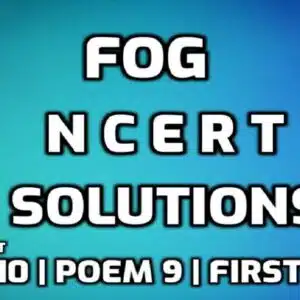
Thinking About the Poem – Fog NCERT Solutions (Page 115)
Q1. (i) What does Sandburg think the fog is like?
Ans. Sandburg thinks that the fog is like a small cat.
(ii) How does the fog come?
Ans. The fog comes silently like a small cat. It comes suddenly from nowhere unseen like a stalking cat.
(iii) What does ‘it’ in the third line refer to?
Ans. The word ‘it’ in the third line refers to the fog as well as to the cat. The fog changes into a metaphorical cat and the cat changes back into the fog.
(iv) Does the poet actually say that the fog is like a cat? Find three things that tell us that the fog is like a cat.
Ans. Yes, the poet actually says that the fog is like a cat. The following examples prove it.
(a) The fog comes ‘on little cat feet’.
(b) It engulfs everything inside its fold as the cat does while sitting on its haunches.
(c) The cat never stays in one place. In the same way, the fog comes suddenly and moves ahead within no time.
Q2. You know that a metaphor compares two things by transferring a feature of one thing to the other. (See unit 1)
(i) Find metaphors for the following words and complete the table below. Also, try to say how they are alike. The first is done for you.
| Storm | tiger | pounces over fields, growls |
| Train | ||
| Fire | ||
| School | ||
| Home |
Ans.
| Storm | tiger | pounces over fields, growls |
| Train | caterpillar | moves with numerous legs |
| Fire | sun | warmth, brilliance |
| School | temple | temple of learning |
| Home | shelter | provides protection and safety |
(ii)Think about a storm. Try to visualise the force of the storm, hear the sound of the storm, feel the power of the storm and the sudden calm that happens afterwards. Write a poem about the storm comparing it with an animal.
Ans. A storm and a lion
Both are the same
Can you ever
Overpower them or tame
Threaten and will destroy
All it is their only game.
Q3. Does this poem have a rhyme scheme? Poetry that does not have an obvious rhythm or rhyme is called ‘free verse’.
Ans. The poem Tog’ has no rhyme scheme. It is written in the ‘blank verse’ or ‘free verse’.